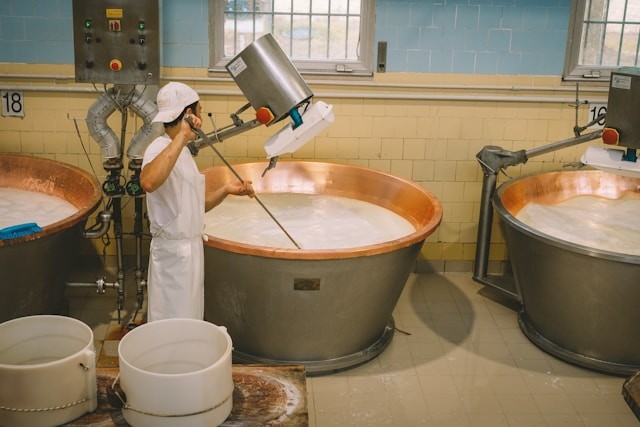Key Takeaways
- Understanding the crucial role of industrial blenders in manufacturing.
- Benefits and applications of high-efficiency blending techniques.
- Enhancing production processes in various industries through advanced blending technologies.
Introduction to Industrial Blenders
In the intricate and competitive world of manufacturing, achieving precision and efficiency is essential. Industrial blenders are among the unsung heroes of this sector, providing an essential service in converting raw materials into uniform, high-quality products. They play a pivotal role across countless industries, ensuring products are mixed to perfection, whether in texture, composition, or quality. A prime example is within the food industry, where an industrial mixer for food blending is critical in achieving the desired consistency and flavor profiles in products ranging from sauces to spices. These machines are designed to handle bulk quantities while maintaining consistency, which is vital for meeting stringent industry standards.
Beyond merely blending, industrial blenders are essential components of manufacturing lines that have a big influence on the productivity and caliber of the finished product. They allow manufacturers to produce at scale, ensuring each batch is homogeneous, thereby maintaining brand integrity and customer satisfaction. This precision transformation of raw materials to finished goods speaks volumes about their importance, acting as a backbone in numerous production processes.
Types of Industrial Blenders
Industrial blenders come in various shapes and sizes, each tailored to meet specific blending needs across different sectors. Ribbon blenders, for instance, are ideal for mixing dry solids, ensuring even particle distribution. On the other hand, rotary blenders are suited for blending wet and dry ingredients, offering a versatile solution for manufacturers dealing with complex formulations. V-blenders and double-cone blenders are preferred for delicate operations where gentle mixing is required to maintain the integrity of the ingredients. This variety allows industries to select blenders that perfectly align with the material characteristics and the desired output, thus optimizing their production processes.

Applications in the Food Industry
In the food industry, industrial blenders are invaluable; their role extends from mixing dough and batters to blending seasonings and flavors. This sector benefits immensely from the precision of industrial blenders, which ensures the consistency of flavors and textures that consumers expect. Large-scale operations, such as those found in multinational food corporations, exemplify the successful application of these machines. These companies can achieve increased production speeds, reduced downtime, and less waste by utilizing advanced blending techniques. The consistency and quality assurance provided by blenders in food production not only meet but often exceed regulatory standards.
Enhancing Efficiency in the Pharmaceutical Industry
The pharmaceutical industry places immense emphasis on precision, given the critical nature of its products. Industrial blenders designed for pharmaceutical production meet this need by ensuring meticulous blending processes, which are crucial for the safety and efficacy of medications. These specialized blenders are equipped to handle sensitive materials that require precise control over particle size distribution and homogeneity. As a result, manufacturers can minimize the risk of dosage discrepancies, thereby safeguarding consumer health. The evolution of these machines has led to significant advancements in ensuring product quality while reducing labor costs and improving production timelines.
The Impact of Quality Blending in the Chemical Industry
Quality blending in the chemical industry is imperative, given the complexity and diversity of chemicals used. Industrial blenders help mitigate the challenges posed by varying properties of raw materials, such as volatility and reactivity. They ensure thorough mixing while maintaining the integrity and safety of the materials. The industry’s reliance on these machines is evidenced by ongoing research and development aimed at emerging technologies in chemical blending. Such innovations continue to enhance the efficiency, safety, and environmental footprint of chemical production processes, allowing manufacturers to meet increasingly stringent regulatory requirements.
Sustainability and Eco-Friendly Practices
Industrial blenders have changed to encourage more environmentally friendly operations as sustainability becomes a major concern for industries around the world. These machines reduce waste output by enhancing blend conversions and ensuring uniformity, which minimizes the need for reprocessing batches. Furthermore, a lot of manufacturers are looking into using environmentally friendly materials in the design and functionality of blenders. This not only aids in conserving resources but also aligns with the global push towards reducing the environmental impact of industrial activities. By implementing greener processes, companies can achieve both operational efficiency and environmental sustainability.

Future Trends in Industrial Blending
The future of industrial blending is poised for significant transformations with the integration of cutting-edge technologies. Innovations such as automation and smart sensors are expected to redefine the capabilities of industrial blenders, offering new levels of precision and adaptability. These advancements align with broader future prospects of manufacturing technologies that emphasize automation, data analytics, and connectivity. As industries look towards the future, the continued evolution of industrial blenders is anticipated to facilitate smarter manufacturing processes, ultimately leading to better product quality and reduced operational costs.
Conclusion and Summary
In conclusion, industrial blenders remain a cornerstone in multiple manufacturing sectors, offering substantial benefits in terms of efficiency, precision, and product quality. Their role in transforming raw materials into reliable, high-quality products underscores their vital importance. As industries increasingly adopt modern blending techniques, they will likely experience significant gains in productivity and sustainability. With technological advancements on the horizon, the future of industrial blenders looks promising, poised to further enhance manufacturing capabilities while supporting the global shift towards sustainable practices.



































